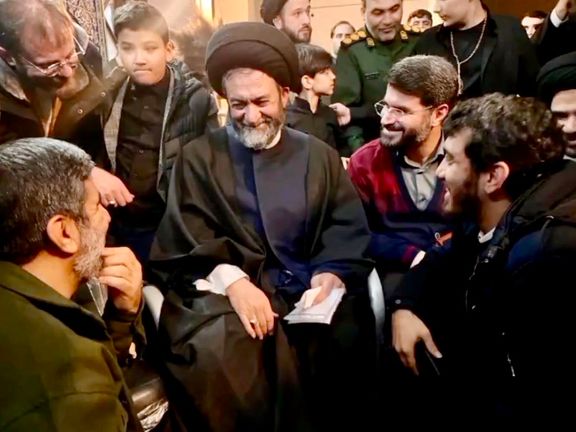How did a religious eulogist spark tension in Tehran-Baku relations?

Iranian authorities are facing criticism over a recent incendiary speech by a eulogist that has further strained the Islamic Republic’s relations with the Republic of Azerbaijan.

Iranian authorities are facing criticism over a recent incendiary speech by a eulogist that has further strained the Islamic Republic’s relations with the Republic of Azerbaijan.
Last week Baku summoned Tehran's interim chargé d'affaires to demand an end to what it called "provocative actions" by Tehran. It followed a fervent anti-Baku speech by a lay Shia eulogist or religious singer, Gholamreza Gholizadeh, at an event in Ardabil, the capital of the northwestern province of the same name.
Tehran-Baku relations are very complex due to religious, ethnic, economic, and political factors including Tehran’s good relations with Armenia, its other northwestern neighbor, and Baku's strong ties with Iran's archenemy, Israel.
The maddah and his controversial speech
Gholizadeh, who leads a Shia mourning society in Ardabil that organizes ceremonies to honor Shia saints—delivered most of his speech in Turki, a language spoken in Iran's northwestern provinces that Azerbaijanis in the Republic of Azerbaijan easily understand.
During his speech, he referred to Azerbaijani President Ilham Aliyev and Turkish President Recep Tayyip Erdoğan as “bastards” and “consumers of illegitimately acquired food.”
The event, broadcast live by Iran’s state-run News Network, was attended by Seyyed Hassan Ameli, Supreme Leader Ali Khamenei’s representative in the province.
Gholizadeh also declared that Iran would reclaim its former territories in the Caucasus—lost during the Russo-Persian Wars (1651-1828)—and raise the Shia flag there. He further insulted early Islamic figures revered by Sunnis.
Over half the population of the Republic of Azerbaijan follows Shia Islam, but political power largely rests with Sunnis. Baku media often allege that radical Shia groups, such as Hüseynçilər (The Islamic Resistance Movement of Azerbaijan), receive backing from Iran.
The Ardabil event—the first of its kind in the Islamic Republic’s history—commemorated the “martyrs of the Battle of Chaldiran” in 1514. The battle between Iran’s Safavid Shia Empire and the Sunni Ottoman Empire ended in an Ottoman victory.

Criticism of authorities for giving free reign to maddahs
In an editorial on Monday titled “Are Maddahs Free to Say Whatever They Want and Insult Whoever They Wish?” the conservative newspaper Jomhouri Eslami criticized the insults directed at Azerbaijan’s president as both politically and religiously inappropriate.
According to Shia law, calling a person "a bastard" is an offense punishable by eighty lashes.
The newspaper also questioned the relevance of holding an event to commemorate the victims of the Battle of Chaldiran and criticized the failure of provincial authorities, including Ameli, to oversee and regulate such events. All government-approved gatherings in Iran are strictly monitored to ensure compliance with existing policies, though occasional lapses may occur during religious ceremonies.
Ameli who is also a member of the Assembly of Experts and the Friday prayer leader of Ardabil, appointed by Khamenei, took to X on Friday, two days after Baku’s strong reaction to the incident, to argue that the “inappropriate language” used by the maddah should not be construed as representing the Islamic Republic’s official stance.
Ameli’s post received nearly 350 comments, with opinions divided. While some supported the maddah’s highly controversial remarks, others criticized Ameli for failing to intervene during the speech, which he had praised as “epic.”
Critics alleged close ties between Ameli and the maddah’s religious group, with one commenter among the hundreds asking, “Were you not there? Why did you let him swear and insult? Stop this bragging and focus on the country’s progress. We will get nowhere with war and enmity.”
Another user, Gholamreza Tabrizi, claimed to have heard the full audio recording of the speech and warned that, if published, it could spark a diplomatic crisis with Sunni Saudi Arabia and the United Arab Emirates, because of its anti-Sunni content.
Under Supreme Leader Ali Khamenei’s three-decade leadership, eulogists have gained prominence in both religious and political spheres. Many “celebrity eulogists” are closely affiliated with ultra-hardline political factions and use state-sponsored events, including Friday prayers, to promote their views.
“The most inappropriate language, the most irrelevant stances, and the most unconventional topics are often raised during Friday sermons,” wrote Hossein Selahvarzi, a former head of Iran’s Chamber of Commerce, in an X post addressing the Ardabil incident. “These actions frequently have repercussions for the country’s diplomatic apparatus and economy.”
Also criticizing the authorities for the recent incident in Ardabil, Mohsen Gharavian, a conservative politician and cleric, warned the authorities about the political and religious implications of maddahs’ increasing involvement in politics.
“The country’s key political authorities, such as the Supreme National Security Council … should warn these maddahs and thwart such divisiveness to prevent damages and political and social problems in the current sensitive situation in the region,” he said in an interview with the Iranian Labour News Agency (ILNA) published Sunday.